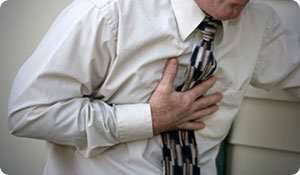
See what people are saying about this article on our Facebook page!![]()
You're experiencing tightness, burning, and pain in your chest. You immediately wonder whether it's heartburn caused by that spicy meal you just polished off, or the worst case scenario—a heart attack.
Knowing the difference—and making a quick decision about treatment—could actually save your life.
Diagnosing angina versus simple indigestion can be tricky. Here's what you need to know.
Angina occurs when there's not enough blood flow to the heart. A symptom of coronary artery disease, it causes tightness, heaviness, and discomfort. "We usually think of angina as pressure, the feeling that someone is sitting on your chest," says Tara Narula, MD, attending cardiologist at Lenox Hill Hospital in New York City. "But some people describe it as sharp pain, a burning sensation." Dissolving nitroglycerine under the tongue can dilate the blood vessels in the area and bring relief.
A rule of thumb is that if the discomfort is "anywhere between the nose and the navel that comes on with exertion or emotion and is relieved by rest, that's angina until proved otherwise," says Gordon Ewy, MD, professor of cardiology at the University of Arizona College of Medicine.
Heartburn typically develops after a spicy or greasy meal and can cause many of same symptoms. Not sure if it's heartburn? "One of the best ways to tell if it's heartburn is to take some Pepto Bismol," Ewy says. "If the chest pain is due to too much stomach acid, you'll feel so much better in a few minutes that it's like putting out a fire."
True heartburn tends to be centered, not on the left side, says Narula. It can even go up into the throat area. It tends to not be associated with fatigue, sweatiness, and a moving pain that can radiate to the jaw.
There's also something called unstable angina, Narula says. If sudden, new pain comes on and it feels very differently from earlier bouts of angina, it could even signal that a heart attack is impending. But those symptoms can also be similar to those from heartburn. "It can be hard to tease out when the pain is from a cardiac cause like angina and when it's not," Narula says.
Recognizing a heart attack can be tricky because it doesn't always involve what you may think of as the classic symptoms. "Often a patient who is having a heart attack is not in pain," says Elsa Grace Giardina, MD, cardiologist at NewYork-Presbyterian Hospital/Columbia Medical Center. "They may have nausea, fatigue, and shortness of breath."
Chest pain also can be brought on when another organ is acting up. Gall bladder attacks and an inflammation of the pancreas are other causes, Giardina says. To know the difference, keep in mind that cardiac pain is most often associated with activity. "People notice it while they are walking or exercising," she says. "These put a greater demand on the heart. Pain from the pancreas or gall bladder is not associated with activity."
The bottom line: If you are having symptoms, and you have risk factors like a family history of heart disease and obesity, it's worth getting checked out, Narula says. "It's better to err on the side of caution and see if it's cardiac," she says.
If you are wondering if it's a heart attack, don't wait for a roommate or a family member to get home and drive you to the hospital. "It's very important to get to the hospital in a timely fashion," Giardina says. "Don't try to drive yourself and don't be shy. Call 911."
See what people are saying about this article on our Facebook page!![]()





